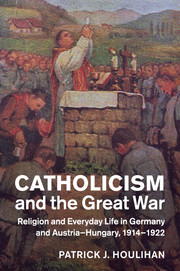Book contents
- Frontmatter
- Dedication
- Contents
- List of figures
- Acknowledgments
- Note on the text
- List of abbreviations
- Introduction
- 1 Catholicism on the eve of the Great War in Germany and Austria-Hungary
- 2 Theology and catastrophe
- 3 The limits of religious authority: military chaplaincy and the bounds of clericalism
- 4 Faith in the trenches: Catholic battlefield piety during the Great War
- 5 The unquiet homefront
- 6 A voice in the wilderness: the papacy
- 7 Memory, mourning, and the Catholic way of war
- Conclusion
- Sources
- Index
1 - Catholicism on the eve of the Great War in Germany and Austria-Hungary
Published online by Cambridge University Press: 05 May 2015
- Frontmatter
- Dedication
- Contents
- List of figures
- Acknowledgments
- Note on the text
- List of abbreviations
- Introduction
- 1 Catholicism on the eve of the Great War in Germany and Austria-Hungary
- 2 Theology and catastrophe
- 3 The limits of religious authority: military chaplaincy and the bounds of clericalism
- 4 Faith in the trenches: Catholic battlefield piety during the Great War
- 5 The unquiet homefront
- 6 A voice in the wilderness: the papacy
- 7 Memory, mourning, and the Catholic way of war
- Conclusion
- Sources
- Index
Summary
Through a sketch of pre-1914 developments of Catholicism in Germany and Austria-Hungary, one can properly assess the continuities and changes that the war represented. Religious mentalities were absolutely essential to people's worldviews on the eve of the Great War. Religious belief and practice helped form an essential part of everyday life, particularly in peasant and rural regions. These religious traditions would adapt to the upheavals of war, demonstrating resilence and comfort in the face of potentially atomizing chaos.
This chapter proceeds in a hierarchical fashion that respects the power of different institutional politics at the elite level but also recognizes cultures of everyday life for the majority of rural inhabitants in the empires. Although much of the religious history of Central European Catholics is a story of shared overlap in peasant regions, important imperial differences remain. The methodology of the chapter highlights certain structural features based on their historiographical significance to the respective empire. For example, the “nationalities” question is treated in the section about Austria-Hungary and ultramontanism remains in the context of the Kulturkampf in Germany. One could also speak about the “Polish” or “Alsatian” members of the Hohenzollern monarchy and the rise of ultramontanism after the post-1855 Concordat in the Habsburg monarchy. Thus, examining these issues as placed is not a claim of imperial exclusivity but rather a matter of historiographical prominence. Nevertheless, the historiography gives an idea of the disparate political contours of the empires. As the chapter proceeds to discuss matters of everyday life for Catholics, irrespective of political frameworks, it becomes much more of an “entangled history” of a common Catholic way of life in Central Europe.
The chapter begins by examining the socio-political scene in comparative frameworks. Catholics in Austria-Hungary were a favored majority religion and part of the throne-and-altar alliance. In Germany, by contrast, Catholics were a suspect minority religion newly integrated into a Protestant-dominated German Empire largely controlled by Prussia.
- Type
- Chapter
- Information
- Catholicism and the Great WarReligion and Everyday Life in Germany and Austria-Hungary, 1914–1922, pp. 20 - 49Publisher: Cambridge University PressPrint publication year: 2015



